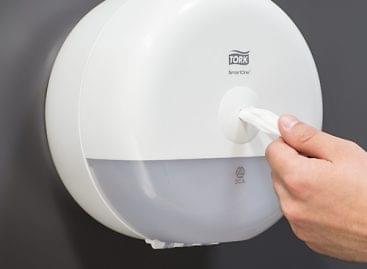MMSZ Green Club meeting at Danone: sustainable operations in practice
Once again the joint event organised by the Green, HoReCa and Event Chapters of the Hungarian Marketing Association (MMSZ) focused on the practical aspects of sustainability.
This article is available for reading in Trade magazin 2025/8-9.
This time the host was Danone Magyarország Kft. at its Budapest office and country lead Péter Csaplovics welcomed participants. Next Beáta Várkonyi, Danone’s director of corporate affairs in Central and Eastern Europe talked about the company’s history, mission and sustainability efforts. Today Danone is present in more than 150 countries, with global sales of EUR 27.37bn in 2024.
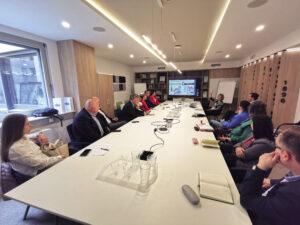
Danone’s Budapest office hosted the presentations on sustainability
B Corp for all business lines
Danone’s once diverse portfolio has been streamlined: fresh dairy products, plant-based foods, infant and early life nutrition, and clinical nutrition products form the core of its business. The portfolio includes well-known brands such as Actimel, Activia, Alpro, YoPRO, Oikos, Danette, Danonino, Nutricia, Milupa and Milumil. What these products have in common is that – in addition to nutrition – they also represent health promotion and social responsibility. The Danone Impact Journey strategic framework plays a key role in achieving regional goals. Danone, with sales of HUF 43.1bn on the Hungarian market, has been B Corp certified since 2021 and the company’s goal is for all its business units to obtain this certification by 2030. “B Corp isn’t a campaign, but a long-term operating philosophy”, emphasised Beáta Várkonyi.
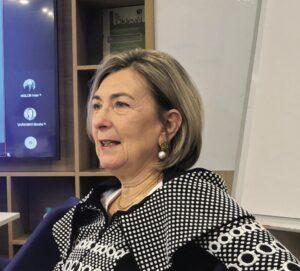
Corporate affairs director for Danone CEE, Beáta Várkonyi was speaking also about the importance of the B Corp certification achieved as part of the company’s Impact Journey
Practical steps in the green strategy
Iván Holub, Danone CEE’s OPOH sustainability lead joined the event online and focused on the measurability of green targets and aspects of regional implementation. He told that sustainable solutions are only viable if they can be adapted to regional conditions and are also successful from a business perspective. Danone’s regional sustainability focus includes using less added sugar, cutting down on artificial additives and promoting plant-based alternatives. Danone also provides consumers with transparent information via the Nutri-Score labelling.
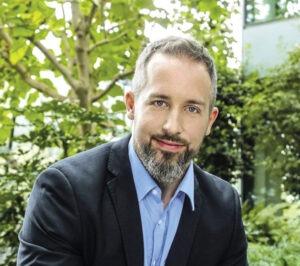
Iván Holub, a Danone CEE OPOH sustainability lead focused on the measurability of green targets and the aspects of regional implementation
The road to carbon neutrality
Next Péter Király, managing director of Carbonline Footprint Kft. gave a more detailed overview of the components of the corporate carbon footprint and practical solutions. The Carbonline carbon-neutral company programme offers practical guidance for companies, helping them take tangible steps towards more environmentally conscious operations, including increasing energy efficiency, purchasing green energy and using emission offset options.
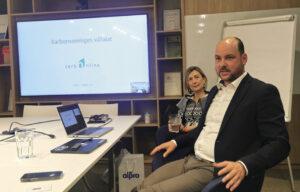
Péter Király, managing director of Carbonline Footprint Kft. stressed that reframing of the supply chain is inevitable in order to reduce Scope 3 emissions
Péter Király also discussed the significant burden that the invisible energy demands of the digital world put on the environment. A single Google search uses approximately 0.3 watt-hours of energy, while a ChatGPT question requires 10-20 watt-hours, which is comparable to the daily consumption of a four-person household. In the Carbonline programme the first step is usually a detailed energy efficiency audit. This is followed by the procurement of electricity from renewable energy sources. Finally, compensation solutions such as afforestation programs or biogas projects can also contribute to carbon neutrality.
Related news
Tork at SIRHA Budapest: hygiene, efficiency and sustainability for the HoReCa sector
🎧 Hallgasd a cikket: Lejátszás Szünet Folytatás Leállítás Nyelv: Auto…
Read more >Bonduelle achieves B Corp™ certification worldwide
🎧 Hallgasd a cikket: Lejátszás Szünet Folytatás Leállítás Nyelv: Auto…
Read more >Every second German drinks plant-based
🎧 Hallgasd a cikket: Lejátszás Szünet Folytatás Leállítás Nyelv: Auto…
Read more >Related news
Festival buzz at the 60th anniversary EuroShop trade fair
🎧 Hallgasd a cikket: Lejátszás Szünet Folytatás Leállítás Nyelv: Auto…
Read more >Historic price reduction at ALDI
🎧 Hallgasd a cikket: Lejátszás Szünet Folytatás Leállítás Nyelv: Auto…
Read more >

